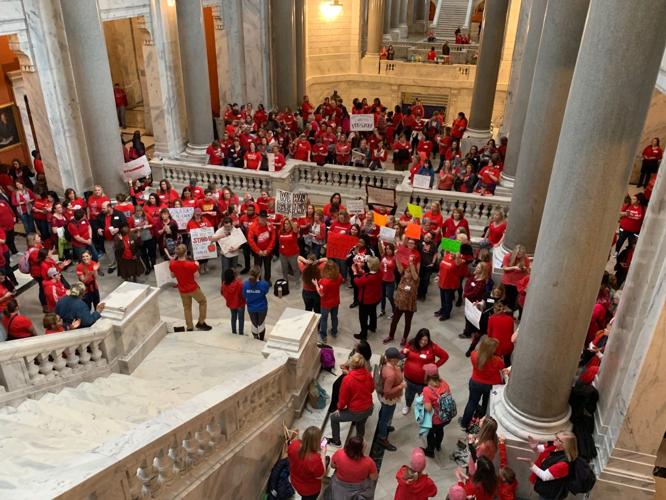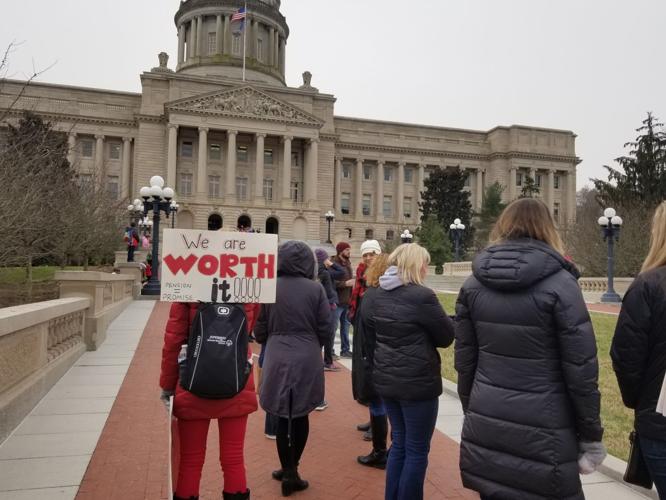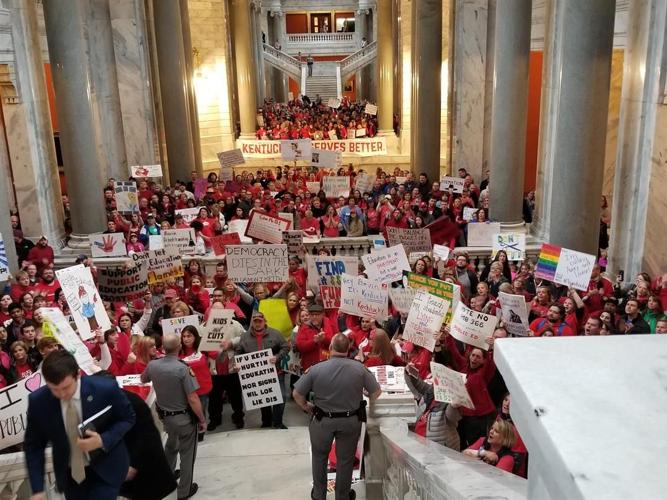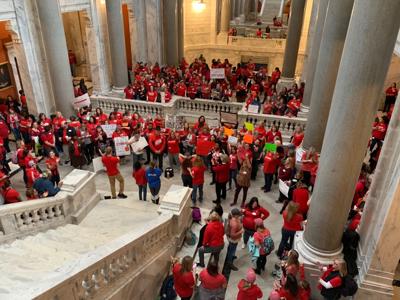LOUISVILLE, Ky. (WDRB) – Will Jefferson County Public Schools have school on Thursday?
Or will Kentucky’s largest school district will be closed for the seventh “sick out” this year so teachers can keep an eye on lawmakers during the final day of 2019 legislative session?
The six demonstrations in February and March, led primarily by JCPS teachers, have drawn rebukes from some in Frankfort, including Kentucky Education Commissioner Wayne Lewis. He’s asked 10 school districts to produce the names of those who requested sick leave on days when schools were closed because of teacher shortages.
After refusing to back down from his request for teachers’ names in response to a JCPS board resolution on Tuesday, Lewis offered a carrot that’s tied to a pretty heavy stick: He won’t push for educators to be punished for forcing their school districts to close if there are no work stoppages on Thursday.
Despite that and assurances from four local lawmakers that bills teachers oppose will not be taken up on the legislature’s last day, some JCPS teachers expect their colleagues to stage another sick out.
The movement started as a demonstration called by the statewide grassroots group KY 120 United against a bill that would diminish the influence of the statewide teachers union on the Kentucky Teachers Retirement System’s board. It eventually morphed into a more lengthy protest coordinated primarily through the offshoot group JCPS Leads.

Teachers fill seats in the audience for the Feb. 28, 2019, House State Government Committee meeting in Frankfort. The panel took up House Bill 525, which drew a call for action by the group KY 120 United.
Beyond the KTRS legislation, House Bill 525, area teachers also mobilized against bills to give JCPS Superintendent Marty Pollio and his successors unilateral authority to hire principals, and to create tax credits for donations to private-school scholarships.
Dan Wise, Seneca High School’s band director and building representative for the Jefferson County Teachers Association, said he’s heard “some rumblings” that another sick out is on the horizon, especially after the surprise pension reform bill that the Republican-controlled legislature passed in a single day in 2018.
“They want to keep them in check and make sure that we’re there so we don’t do that again,” Wise said.
Others are holding out hope that JCPS teachers will try a different approach and follow the delegate plan laid out by Pollio and JCTA President Brent McKim. That plan would allow schools to send three teachers to the Capitol on Thursday while JCPS manages the absences. Wise said he supports the delegate plan but stands ready to demonstrate if legislators move on some of the bills teachers oppose.
JCTA and the Kentucky Education Association have cautioned teachers against staging sick outs and have not endorsed the practice. McKim, speaking to reporters after Tuesday’s school board meeting, said he hoped that JCPS teachers will consider the delegate plan on Thursday and beyond.
“We’ll continue to advocate for our members’ First Amendment rights and also for win-win solutions if we can find those,” McKim said.
Jason Nelson, a social studies teacher at Noe Middle School, hopes his fellow teachers adhere to the delegate plan, as there appears to be no immediate threat of legislation that teachers oppose advancing on Thursday.
“We understand the inconvenience that it causes parents, and we want to make sure that when we do sick out, when we take action like that, that we are acting on the best information possible and that we are fighting something that really needs to be fought that day,” said Nelson, who recently started a Facebook group called Kentucky Teacher Demands.
However teachers feel about the sick out protests, one thing is clear: Teacher demonstrations in Kentucky and elsewhere have moved beyond concerns about pay and retirement benefits to a larger battle for the future of traditional public education.
Kentucky is not alone in that regard.
In West Virginia, all but one county school district went on strike for two days this year after lawmakers lumped pay raises promised to teachers into a wide-ranging bill that also authorized charter schools.
“We know that if we don’t fight for education, nobody else is going to,” said Matthew Kaufmann, an English teacher at Moore Traditional High School in Louisville. “It’s up to the teachers to do it, and we’ve seen how hurtful charters and voucher programs are to other states.”
A broken trust
Teachers in Jefferson County and elsewhere staged the sick outs this year even without the support of their unions, showing a palpable lack of trust that many have for lawmakers after last year’s fast-tracked pension reform bill.
The legislation, dubbed the “sewer bill,” started March 29, 2018, as an 11-page measure regarding wastewater facilities. It morphed into a 291-page overhaul of Kentucky’s pension offerings for public workers, including shifting future teachers away from defined-benefit retirement plans and into hybrid-cash-balance programs.
The legislation flew through both houses of the legislature on the same day it was unveiled. Within days, thousands of Kentucky teachers flocked to the Capitol to voice their outrage at the maneuver.

Thousands of Kentucky teachers came to the Capitol April 2, 2018, to protest against Senate Bill 151, the so-called "sewer bill" that altered pensions for future educators and was later overturned.
But Senate Bill 151 would later be thrown out by the Kentucky Supreme Court on procedural grounds in a unanimous decision last December.
With a day left for lawmakers to conduct business, some teachers remain unconvinced that the bills they’ve protested this session are truly dead.
“Unless we go there and watch what they’re doing and keep it in the light, whether it’s through our phones, through our voices or social media, shady things are going to be going on, and we’re very worried about that,” Kaufmann said.
Senate Minority Floor Leader Morgan McGarvey, a Louisville Democrat, said he understands the unease.
“That type of trust, that type of faith is going to have to be earned over time,” said McGarvey, one of the four Louisville lawmakers who, in a March 13 statement, tried to reassure teachers that the bills would not advance.
Even so, enough JCPS teachers called in absences to trigger a sixth sick out on March 14, the day legislators adjourned for the 10-day veto break.
“I hope by joining together on a very specific purpose with people like Marty Pollio, with people from the other party in saying these bills are dead this session, that helps alleviate concerns for right now,” McGarvey said. “These bills will be back. They do enjoy support in the state legislature, so the war isn’t over, but I think this battle for this year and this session is.”
Rep. Jason Nemes, a Louisville Republican who also signed on to the March 13 statement, said it would be “extremely important” for lawmakers to speak directly with teachers in their districts as they try to rebuild trust with educators.
But he questioned why teachers weren’t outraged when Democrats filed similar scholarship tax credit bills as far back as the 2010 legislative session. That year, Democratic Rep. Terry Mills of Lebanon filed a bill that would have granted up to $200,000 in tax credits per year for donors to private-school scholarship groups.
In 2016, then-House Majority Whip Tommy Thompson of Owensboro backed a bill that would have authorized up to $25 million in scholarship credits . Six other Democrats signed on as co-sponsors, including former House Speaker Pro Tem Larry Clark and Rep. Dennis Horlander, both of Louisville.
“It didn’t evoke this kind of reaction, and so that, I think, is because of the fundamental distrust that teachers have toward legislators,” Nemes said. “We think in some ways it’s unwarranted, but I think we also need to understand that in many ways it is warranted and we have to do better.”
House Minority Whip Joni Jenkins, D-Shively, said she would encourage members of Republican leadership “to be more transparent” on policies they hope to enact during sessions.
“Things need to change,” she said, noting that nearly half of Kentucky’s state representatives are in their first or second terms. “We need to change the way we do business. We need to be more open, more deliberate and more transparent, and so I’m hoping that’s a message that other people are sending to their state representatives and state senators as we go into the 2020 session.”
Teachers like Nelson say they simply want a voice when lawmakers are considering education policies.
“We’re having to react,” Nelson said. “We’re having to fight them, and they’re not inviting us to the table.”

Teachers wait to enter the Capitol on March 7, 2019.
Sick out ramifications
After Lewis made his requests for information from school districts that called off classes, many decried the move as a means to intimidate teachers who protested at the Capitol this year. The education commissioner said that’s not the case and he wants to use the data to help formulate policies that allow teachers to express their opinions without shuttering districts.
While some JCPS teachers are concerned that they might risk disciplinary action after this year’s sick out demonstrations, others have been galvanized by Lewis’s request for data, including their names.
“It’s raising a concern, but I don’t think it’s raising the concern that the commissioner was intending,” said Seth Pollitt, a social studies teacher at Southern High School who supports the delegate plan. “It’s hard to scare people who spend their entire careers around teenagers.”
Others worry that Lewis will not tolerate additional sick outs, which is the only sort of work stoppage available to teachers, as state law doesn’t allow government workers to strike.
“I am concerned that maybe is a tool that we’ve taken out of our bag and we may not be able to use it in the future,” Nelson said.
“Not having the ability to strike limits some of the direct action that we’re capable of doing, but I’m not going to rule it out completely. I think this is still something that we can look toward possibly utilizing next year.”
Correction: A previous version of this story incorrectly identified Noe Middle School as an elementary school.
Copyright 2019 WDRB News. All rights reserved.















